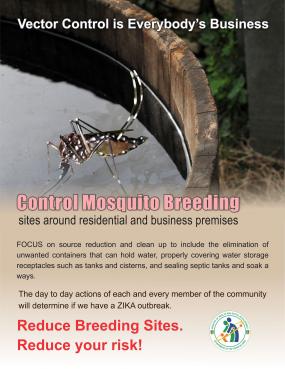Public Health Communications Specialist
Ministry of Health/Social Development
Telephone: 468-2286
Email: nlettsome@gov.vg
Press Release
 The Ministry of Health and Social Development is reporting an increase in the number of dengue fever (DF) cases, including severe dengue requiring hospitalisation.
The Ministry of Health and Social Development is reporting an increase in the number of dengue fever (DF) cases, including severe dengue requiring hospitalisation.
National Epidemiologist, Ms. Harmonie Brewley-Massiah said that while the current number of cases remains below the epidemic threshold, public health officials are closely monitoring the situation.
“The Surveillance and Vector Unit has been keenly monitoring the local situation given the on-going outbreaks in other Caribbean countries,” Ms. Brewley Massiah said.
Entomologist, Ms. Camille White, is also concerned. She said, “Each residential assessment of locally affected persons has identified multiple breeding sites positive for the larvae or pupae of Aedes mosquitoes. Breeding sites were mainly in containers like barrels, buckets, tyres, plant pots and gallon bottles.”
Dengue is a viral infection transmitted to humans through the bite of infected Aedes Egpyti and Albopictus mosquitoes, both of which are endemic to the Virgin Islands.
Symptoms include fever, severe headache, eye-pain, nausea, vomiting, rash, joint and body aches, and, in severe cases, bleeding. Symptoms typically last two to seven days, and although severe and life-threatening illness can occur, most people recover within one-two weeks.
Children, the elderly and persons with a prior infection and/or pre-existing conditions such as diabetes, hypertension, obesity and heart disease are particularly at risk for severe dengue- which may require hospitalisation and intensive medical care.
Health authorities are urging the public to be vigilant and proactive by implementing personal protective measures and strict environmental hygiene (cleanliness and sanitation in their surroundings), especially after heavy rainfall, to help control mosquito breeding.
Mosquito breeding control measures include:
- Removing standing water: Mosquitoes breed in stagnant water, so it is important to eliminate any sources around your home, such as in flower pots, buckets, containers, tires or clogged gutters.
- Thoroughly check all roof gutters, and drains to prevent blockage
- Scrubbing and cleaning drains and containers to remove any deposited mosquito eggs
- Properly dispose of debris and garbage, such as soft drink cans, empty bottles and boxes, old tires
- Trimming vegetation reduce mosquito resting areas
- Taking personal protective measures such as
- Wearing light-coloured long-sleeved clothes and trousers to cover exposed skin especially at dusk and dawn (when mosquitoes are most active).
- Applying insect repellent containing DEET, picaridin, or oil of lemon eucalyptus to clothing or uncovered areas of the body when engaged in outdoor activities.
- Using mosquito nets for protection from bites
- Keeping doors closed and/or use screens to keep mosquitoes out of the home.
The Ministry of Health and Social Development is working diligently to control the spread of dengue fever. Residents are urged to take the necessary measures to eliminate standing water and reduce mosquito breeding opportunities around their property.

